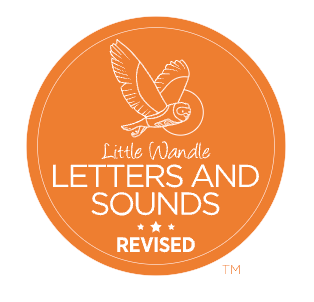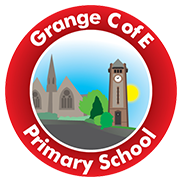English
English Curriculum at Grange C of E School
At Grange School, we believe that English is a vital way of communicating. Through speaking and listening, reading and writing children learn to express themselves creatively and imaginatively and communicate with others effectively.
The study of English helps children understand how language works by looking at its patterns, structures and origins. Using this knowledge, pupils can choose and adapt what they say and write in different situations.
We believe that the study of English should enable pupils:
- To appreciate how speaking and listening, reading and writing are integrated.
- To develop their ability to communicate orally for a range of purposes and audiences.
- To become confident, thoughtful and enthusiastic readers who read for pleasure.
- To use a wide variety of writing styles and genres, so communicating effectively in written forms.
- To practise their handwriting and other presentational skills.
Reading
Phonics (reading and spelling)
 At Grange C of E Primary School our aim is for every child to become a fluent reader and writer. This is why we teach reading through Little Wandle Letters and Sounds Revised, which is a systematic and synthetic phonics programme. We start teaching phonics in Nursery/Reception and follow the Little Wandle Letters and Sounds Revised progression, which ensures children build on their growing knowledge of the alphabetic code, mastering phonics to read and spell as they move through school.
At Grange C of E Primary School our aim is for every child to become a fluent reader and writer. This is why we teach reading through Little Wandle Letters and Sounds Revised, which is a systematic and synthetic phonics programme. We start teaching phonics in Nursery/Reception and follow the Little Wandle Letters and Sounds Revised progression, which ensures children build on their growing knowledge of the alphabetic code, mastering phonics to read and spell as they move through school.
As a result, all our children are able to tackle any unfamiliar words as they read. At our school, we also model the application of the alphabetic code through phonics in shared reading and writing, both inside and outside of the phonics lesson and across the curriculum. We have a strong focus on language development for our children because we know that speaking and listening are crucial skills for reading and writing in all subjects.
Comprehension
At Grange Primary School, we value reading as a crucial life skill. By the time children leave us, they read confidently for meaning and regularly enjoy reading for pleasure. Our readers are equipped with the tools to tackle unfamiliar vocabulary. We encourage our children to see themselves as readers for both pleasure and purpose.
Because we believe teaching every child to read is so important, we have Reading Leaders who drive the early reading programme in our school. They are highly skilled at teaching phonics and reading, and they monitor and support our whole reading team, so everyone teaches with fidelity to the Little Wandle Letters and Sounds Revised programme.
As the children progress into KS2, the purpose of a reading comprehension lesson is to teach children the skills needed to gather meaning and connect the ideas that are given to them on a page. Children are shown that the concept of ‘comprehension’ is used within life throughout the day; for example, comprehending how someone is feeling, understanding what someone is inferring when they talk. The main concepts children focus on are: Retrieval, Vocabulary (Word Meaning), Inference, Sequencing, Summarising, Prediction and Authorial Intent. Fluency continues to be developed with the teacher modelling reading aloud.
Reading in our school is progressive and planned to meet the needs of all children. Assessments are carried out regularly to identify any child needing additional support as soon as they need it and ensure children are accessing books of the right level and are being challenged in their reading. At the same time, we provide books to ensure that children read for pleasure and learn to love reading.
Writing
Writing is an integral part of our curriculum. At Grange C of E Primary School, our writing, grammar, punctuation and spelling curriculum is based upon the National Curriculum programmes of study and lessons take place every day across the school. Teachers use the National Curriculum and writing progression grids to derive long term plans in the subject; careful consideration is given to the sequence of the curriculum and ways in which the lessons build towards a piece of writing which showcases pupils' acquired knowledge, skills and understanding. Teachers and the English Subject Leader pay careful attention to the cohorts in school. Together, they tailor the curriculum to meet the needs and interests of our pupils and choose texts to derive the writing curriculum upon which inspires and motivates pupils to learn; in turn, this establishes pupil enjoyment and engagement in the subject.
The aims of teaching writing in our school are to develop pupils who:
- Have an interest in words, their meaning; developing a growing vocabulary in spoken and written forms;
- Understand a range of text types and genres;
- Are able to write in a variety of styles and forms appropriate to the situation;
- Develop the powers of imagination, inventiveness and critical awareness;
- Have a suitable repertoire of technical vocabulary to articulate their responses;
- Produce independent pieces of writing during ‘Big Writes’ using correct punctuation and sentence construction;
- Are able to share their success with others through the use of Working Walls;
- Become more confident in writing extended pieces of text;
- Have knowledge of the work of a range of authors, poets and playwrights.
The Early Years Foundation Stage Curriculum is divided into prime and specific areas of learning and development. 'Communication and Language' is one of three prime areas that are fundamental to supporting their language development. 'Communication and Language' is made up of the following aspects: listening and attention, understanding and speaking. ‘English' is one of four specific areas which include the development of essential skills and knowledge and is made up of the two aspects: reading and writing. Pupil provision is related to attainment, not age. Children learn through play, speaking and listening activities, teacher modelling, group work and self-direction.
At Grange we teach specific Grammar sessions which are then applied in children’s writing. As part of our enriched curriculum, opportunities for teaching English are planned for in a variety of ways, including through author visits, theatre workshops, themed days and via other subjects.
Speaking & Listening
Acquisition of language is of vital importance to us at Grange C of E School and throughout writing lessons we aim to support children in widening their vocabulary, accessing language at least 18 months beyond that which they may use naturally. We achieve this through techniques such as ‘Picture Power’, ‘Shades of Meaning’ and focussing on the sentences ‘Intent’.
We teach our pupils to speak clearly, to convey their ideas fluently and confidently and to ask questions; the use of Pie Corbett’s ‘Talk4Writing’ teaching framework across the school supports this. At Grange School we ensure that all children see themselves as a writer. To further support this, we use Jane Considine’s ‘The Write Stuff’ from Reception through to Year 6 with results that we are enormously proud of. The Write Stuff brings clarity to the mechanics of writing and provides clear systems through which to focus the writer’s attention.
Handwriting
At Grange Primary School, we are proud of our pupils’ handwriting and take particular care in our cursive/joined-up handwriting style. This is progressive throughout the school and covers the requirements of the 2014 National Curriculum. Handwriting is a basic skill that influences the quality of work throughout the curriculum. At the end of Key Stage 2 all pupils should have the ability to produce fluent, legible and, eventually, speedy joined-up handwriting, and to understand the different forms of handwriting used for different purposes.
By the end of Year 6 pupils will understand the importance of neat presentation and the need for different letter forms (cursive, printed or capital letters) to help communicate meaning clearly.
We are delighted that our school is part of the Letter-join handwriting scheme (see separate handwriting policy) and any of our pupils wishing to practise their handwriting at home can log in to the Letter-join website on iPads and tablets as well as desktop and laptop computers. There you will find the same, easy-to-use handwriting resources we use at school. Children in the early stages of writing do not use cursive handwriting as this is in line with the Little Wandle scheme which we follow.








